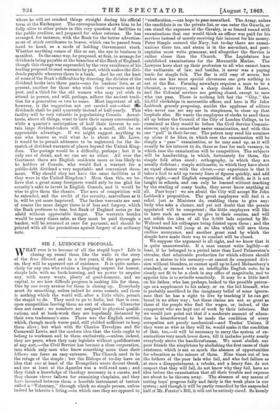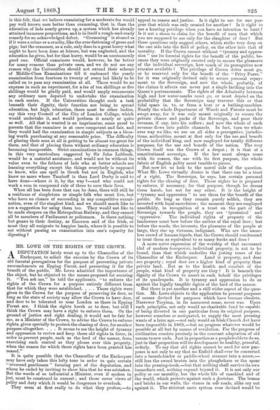SIR J. LUBBOCK'S PROPOSAL
WHAT ever is to become of all the stupid boys ? Life is closing up round them like the walls in the story of the Iron, Shroud, and in a few years, if the process goes on, they will be squeezed out of existence. It is quite melan- choly for any one who retains a lingering respect for honest, simple lads, with no book-learning, and no power to acquire any, with many wants, plenty of good-humour, and no capital, to see how difficult progress is making life for them. One by one every avenue for them is closing up. Everybody must do something, unless indeed he owns consols, and there is nothing which the world will, after a little while, permit the stupid to do. They used to go to India, but that is over, open competition leaving them no sort of chance. Character does not count ; no numbers are assigned to physical qualifi- cations, and at book-work they are hopelessly distanced by their own tradesmen's sons. There was the English service, which, though much worse paid, still yielded sufficient to keep them alive ; but what with Sir Charles Trevelyan and Sir Cornewall Lewis, and the modern idea that the tools ought to belong to workmen and to them exclusively,—unless, indeed, they are peers, when they may legislate without qualifications of any sort,—the Civil Service has become a close corporation, into which only men who know something more than their fellows can force an easy entrance. The Church used to be the refuge of the simple ; but the Bishops of to-day have an idea that one at least of the Evangelists wrote decent Greek, and one at least of the Apostles was a well-read man ; and they think a knowledge of theology necessary in a curate, and they choose clever fellows for examining chaplains, and they have invented between them a horrible instrument of torture called a "Voluntary," through which no simple person, unless indeed he inherits a living,—in which case they are opposed to
"confiscation,—can hope to pass unscathed. The Army, unless the candidate is on the private list, or can enter the Guards, or can stand the expenses of the Cavalry, is so fenced round with examinations that one would think an officer was paid for his services instead of merely receiving fair interest for his money.
Peter Simple entered the Navy, but to-day there are exami- nations there too, and steam is in the ascendant, and post- captains must write grammar, and altogether the Service is rather closer than the Church. The Legislature has established examinations for the Mercantile Marine. The Lawyers have shut up their profession to all who cannot learn
the rudiments of law, and besides, it never was a paying trade for simple folk. The Bar is still easy of access, but unless one has some special cleverness one gets nothing to eat at the Bar. Farming nowadays requires a man to be a chemist, a surveyor, and a sharp dealer in Mark Lane, and the Colonial services are getting closed, except to men who 'can pass. There is nothing left but the "City," the 55,657 clerkships in mercantile offices, and here is Sir John Lubbock gravely proposing, amidst the applause of editors who never can see any use in simpleness, to close up that loophole also. He wants the employers of clerks to send them all up before the Council of the City of London College, to be examined as they would be before the Civil Service Commis- sioners, only in a somewhat easier examination, and with this one "pall" in their favour. The patron may send his nominee up alone if he likes, in which case the examination will be simply a " pass " examination, or he may send up, as it will usually be his interest to do, three or four for each vacancy, in which case the examination will be competitive. The subjects will be handwriting, in which, fortunately for them, the simple folk often excel ; orthography, in which they are usually deficient ; simple arithmetic, in which they have about an equal chance with the clever,—our experience is that it takes a fool to add up twenty lines of figures quickly, and add them right,—and English composition, of which, as it is not taught in schools, and can only be learned without teaching by the reading of many books, they never know- anything at all. Poor boys! we are afraid the City will accept Sir John Lubbock's proposition. The great employers will feel it a relief, just as Ministers do, enabling them to give any- body who asks a chance, and yet not doubt that the person appointed will be competent ; the little employers will like to have such an answer to give to their cousins, and will not relish the idea of all the 9,000 lads rejected by Mr. Walrond and his colleagues being foisted upon them ; and the big tradesmen will jump at an idea which will save them endless annoyance, and another great road by which the simple have made their way to comfort will be closed.
We suppose the argument is all right, and we know that it is quite unanswerable. If a man cannot write legibly—at least, if he belonged to a period later than Lord Palmerston's circular, that admirable production for which editors should erect a statue to his memory—or cannot do compound divi- sion without blunders, or cannot spell up to Lord Malmesbury's standard, or cannot write an intelligible English note, he is clearly not fit to be a clerk in any office of magnitude, and to appoint him is to swindle somebody. It may be a little hard on his father, who has, perhaps, looked to the possible patron- age as a supplement to his salary, or on the lad himself, who is probably sacrificed to the imaginary belief of some ignora- mus that he has a right to live by teaching if he can get bread in no other way ; but these claims are not so great as those of the people who find the wages, or, indeed, of the competent who are kept out of work by their inferiors. But we would just point out that if a moderate amount of educa- tion is henceforward to be made the condition of every occupation not purely mechanical—and Trades' Unions, if they were as wise as they will be, would make it the condition of that, too,—it will be necessary to carry the system of ex- aminations very much lower down, till it includes pretty nearly everybody above the handicraftsman. We must abolish our poor friends the simpletons by abolishing the first cause of their existence, which is not so much the absence of opportunities for education as the misuse of them. Nine times out of ten the fathers of the poor lads who fail, and who feel failure as at once a disappointment, a rebuke, and a heavy fine, do not suspect that they will fail, do not know why they fail, have no idea before the examination that all their trouble and expense are about to be thrown away. The absence of any means of testing boys' progress fully and fairly is the weak place in our system; and though it will be partly remedied by the suspended half of Mr. Forster's Bill, it will not be entirely cured. So keenly
is this felt, that we believe examining for a moderate fee would pay well known men better than cramming, that is, than the education of lads nearly grown up, a system which has already attained immense proportions, and is in itself a rough-and-ready remedy for an acknowledged defect. "Cramming" is abused as if it were a crime or a cruelty, like the over-fattening of geese and pigs; but the crammer, as a rule, only does in a great hurry what ought to have been done at leisure, but was neglected, and the education he gives, but for that hurry, would be an uncommonly good one. Official examiners would, however, be far better for many reasons than private ones, and we do not see any reason why the Universities should not extend their scheme of Middle-Class Examinations till it embraced the yearly examination from fourteen to twenty of every lad likely to be called on to pass any examination at all. There would be no expense in such an experiment, for a fee of ten shillings or five shillings would be gladly paid, and would amply remunerate any ordinary men deputed to undertake the examination in each centre. If the Universities thought such a task beneath their dignity, their function not being to spread education, but high education, there must be other bodies, say this very Council of the City of London College, which would undertake it, and would perform it nearly or quite as well. All that is wanted is an imprimatur, some proof to parents that the examiner is at once competent and fair, and they would hail the examination in simple subjects as a bless- ing worth purchasing at any reasonable price. The difficulty of placing their sons at all is getting to be almost too great for them, and that of placing them without ordinary education is becoming insuperable. Strict examinations in common things, in this very curriculum suggested by Sir John Lubbock, would be a material assistance, and would not be without its value even to the fathers of lads who at better schools are learning everything except the things everybody is supposed to know, who can spell in Greek but not in English, who know no more where Tamboff is than Lord Derby is said to have done—where is it, by the way ?—and who could not work a sum in compound rule of three to save their lives.
When all has been done that can be done, there will still be a residuum of simpletons or simple folk who must live, but who have no chance of succeeding in any competitive exami- nation, even of the simplest kind, and we should much like to see a suggestion for using them too. They would not like to be made sleepers on the Metropolitan Railway, and they cannot all be members of Parliament or policemen. Is there nothing but guano in their destiny, as Emerson said of the Irish, or must they all emigrate to happier lands, where it is possible to eat without passing an examination into one's capacity for digesting ?































 Previous page
Previous page